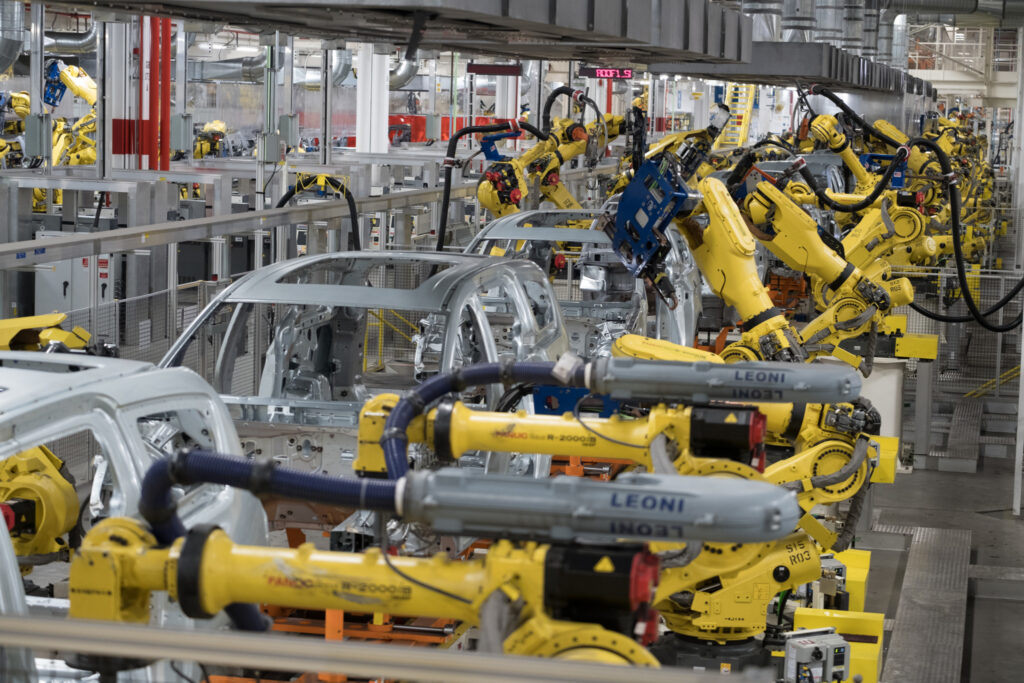Border blockades cripple auto industry
Automakers in Canada are scaling back production and bracing for continued disruptions as trucker blockades at U.S. border crossings worsen an industry-wide parts shortage.
Shipping delays are rippling through the economy amid the ongoing protests that have idled Canada-bound traffic on the Ambassador Bridge linking Detroit and Windsor, Ont.
Thousands of workers have seen their hours cut back as carmakers curb capacity, a situation having a knock-on effect on local suppliers and the broader economy.

“Huge economic problem”
“It’s not only an automotive problem, it’s a huge economic problem for Canada as a whole,” said Dino Chiodo, auto director with Unifor, the largest auto sector union in the country, on Thursday.
“You’ve got wage losses that can’t be made up, and then independent parts suppliers shutting down … the spillover effect is huge.”
The automotive sector, which relies heavily on the trade of goods back and forth across the border, is emerging as one of the hardest hit by the blockades.
Roughly $400 million in goods traditionally cross the Ambassador Bridge every day, representing nearly one-third of all trade between Canada and the United States, said Brian Kingston, president and CEO of the Canadian Vehicle Manufacturers’ Association.
“For the automotive industry, which is totally integrated throughout North America, that is a pivotal piece of infrastructure,” he said.
“We are faced with this very unfortunate situation where this bridge has been blocked. We are now witnessing production stoppages and reductions at auto assembly plants across Ontario.”
With commercial traffic backed up on the bridge linking Detroit and Windsor, automakers have tried to find alternate shipping routes.
Turning to air freight
Yet with many land crossings now impacted by barricades, some companies are resorting to air freighting parts – a costly and unsustainable endeavour.
Toyota Motor Manufacturing Canada said all three of its production lines have been affected, while Ford Canada said it’s running its plants in Oakville, Ont., and Windsor at reduced capacity.
The backlogged supply chain “hurts customers, autoworkers, suppliers, communities and companies on both sides of the border that are already two years into parts shortages,” Ford spokesperson Rose Pao said in a statement.
“We hope this situation is resolved quickly because it could have widespread impact on all automakers in the U.S. and Canada.”
Stellantis, maker of Chrysler and Dodge vehicles, and Honda Canada are up and running after curbing manufacturing capacity Wednesday due to border delays.
Protracted shortages
The carmakers are now planning ahead for potential protracted product shortages should the border crossing remain bottlenecked.
“We expect disruption between now and this weekend, so we continue to adjust our production plans,” Toyota spokesperson Michael Bouliane said in a statement.
The temporary production outages come as automakers grapple with other pandemic-related supply chain challenges, including a semiconductor shortage that has hampered the new car market.
The backlogged Ambassador Bridge – the busiest crossing in North America – typically handles about 7,000 commercial vehicles a day carrying goods traded between Canada and the United States.
The Canadian Trucking Alliance called on all levels of government to put an end to blockades disrupting borders and critical trade routes.
“Many of those who are protesting having their lives disrupted by certain policies are, in turn, ironically disrupting the lives of their fellow Canadians,” Stephen Laskowski, president of the Canadian Trucking Alliance, said in a statement.
“Whether it’s the dedicated truck driver who’s stuck at the border and unable to get home to his or her family or the factory worker who is sent home from work because critical products and raw materials aren’t being delivered, the only people who these blockades hurt are the hard-working Canadians who have kept our nation moving,” he said.
Have your say
This is a moderated forum. Comments will no longer be published unless they are accompanied by a first and last name and a verifiable email address. (Today's Trucking will not publish or share the email address.) Profane language and content deemed to be libelous, racist, or threatening in nature will not be published under any circumstances.
A lot of truck drivers who work for C T A companies say this protest is about choice. They also want someone fom the group to talk to gov and industry people about issues like parking. One hour to move a truck with trailer to safe parking. Many of these drivers have been dropping off $50 or $100 bills in cards. The C T A has not yet offered to talk about issues like hourly wage rate minimums based on experience or overtime pay or medical coverage standards. Many immigration agencies are telling me their drivers are no longer want to come to Canada
A number of companies think this could end up Iin truck drivers doing a large number to stay home for 5 days with covid all across Canada. A number of owners ops that have went out of business in the last 2 years have told their employer that may 2 weeks off on short notice to help with picketing. On January 12 I went on radio stations right across stating a out sick and disabled drivers that ended in a bad position as i had a homeless shelter for address. I was camped out at queens Park from Jan 24 to March 17 of 2020. The O T A did not try to fix the truck driver issues. I understand their is a plan to to bring in 40,000 foreign drivers to replace us if we have strike
See the letter in Ottawa Hill for some the issues 10 days ago